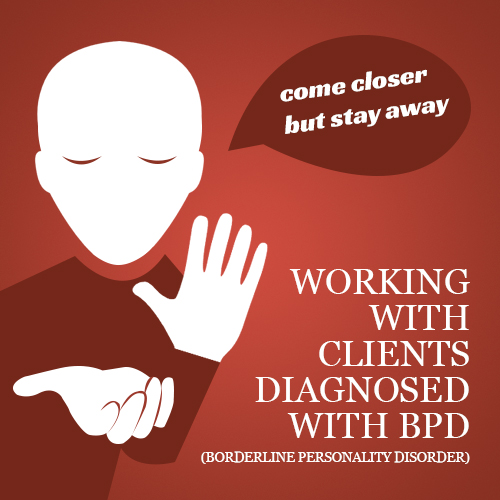Working with clients diagnosed with borderline personality disorder (BPD) can be rewarding, challenging and frustrating.
A significant limitation in individuals diagnosed with BPD is their ability for self-regulation and this can be directly linked to their early attachments. Labile moods, impulsive and risky actions and at times, self harm behavior can present complexities in the therapeutic encounter
Students will explore a number of process oriented, and action based interventions to assist working with individuals spontaneously and creatively. This course also explores working with individuals with BPD through the lens of role theory.
Themes explored during this course.
- What’s in a name – can the term borderline personality disorder cause issues in the therapeutic encounter?
- Explaining role theory – how it may assist in the work you do
- Understanding the interplay between the body’s stress system and the behaviors / emotional lability and self harm demonstrated
- Exploring the multiple reasons for self harm
- Understanding the importance of attachment theory when working with clients diagnosed with BPD
- Exploring issues of transference, counter transference and boundary transgressions
Using a number of case studies to explore the transference/counter-transference issues that may surface in the therapeutic encounter, students will gain greater insight into the roles they demonstrate in reaction or response to the roles demonstrated by the individual (and vice versa).
This tool has been designed to help you develop your practice specific to working with clients diagnosed with BPD. It is envisaged that by the end of this course you will be able to:
- Explain role theory – how can role theory assist when working with clients diagnosed with Borderline personality disorder?
- Appreciate the power of language – does the term borderline personality disorder set up a negative therapeutic encounter?
- Recognize the link between childhood trauma (specifically abandonment & neglect) and borderline personality disorder
- Understand the importance of attachment theory when working with clients diagnosed with Borderline personality disorder
- Understand the interplay between the body’s stress system and the behaviours/emotional lability and self-harm demonstrated by clients diagnosed with Borderline personality disorder
- Identify the multiple reasons for self-harm – and discerning between self-harm in dissociative identity disorder from self-harm in borderline personality disorder
- Understand issues of transference/countertransference and boundary transgressions
- Identify when problems may actually be solutions
This training includes references to recommended readings to complement and support content. These will be linked to separate pages so that you can read them as you go through the course. Videos have been included to provide examples of both complexities and best practices when working with clients diagnosed with BPD. They should be used to stimulate reflection on your practice when working with these clients.
This course will be valuable for teachers, school nurses, clinicians working in mental health, & general health settings, police officers, ambulance officers & staff working in NGO’s.
Certification is available upon successful completion of both the course and assessment and attracts 10 CNE/CPD points where applicable after full payment. The assessment at the end of the tool requires you to complete a number of short answer questions and reflective essay to demonstrate learning achieved from completing the tool which will be reviewed by Dr. Wendy McIntosh. It is important to ensure you have completed the assessment and paid in full if you wish to receive a certificate.
Payable via Paypal securely via the web (for instant access to the course), or via bank transfer (login details emailed after payment).
Terms and Conditions
Without limiting the rights under copyright, no part of this publication (including without limitation; the text, code, artwork, photography, images, music, audio or video material, and audio-visual material in this training) may be reproduced, stored in, or introduced into a database and/or retrieval system or transmitted in any form or any means (electronic, mechanical, photocopying, recording or otherwise) without the prior written permission of the copyright owners – Davaar Consultancy, Training and Development Pty. Ltd. or when applicable, the referenced author or producer of supporting materials.
All rights reserved.
By purchasing access to this training tool, you agree to these terms and conditions.
